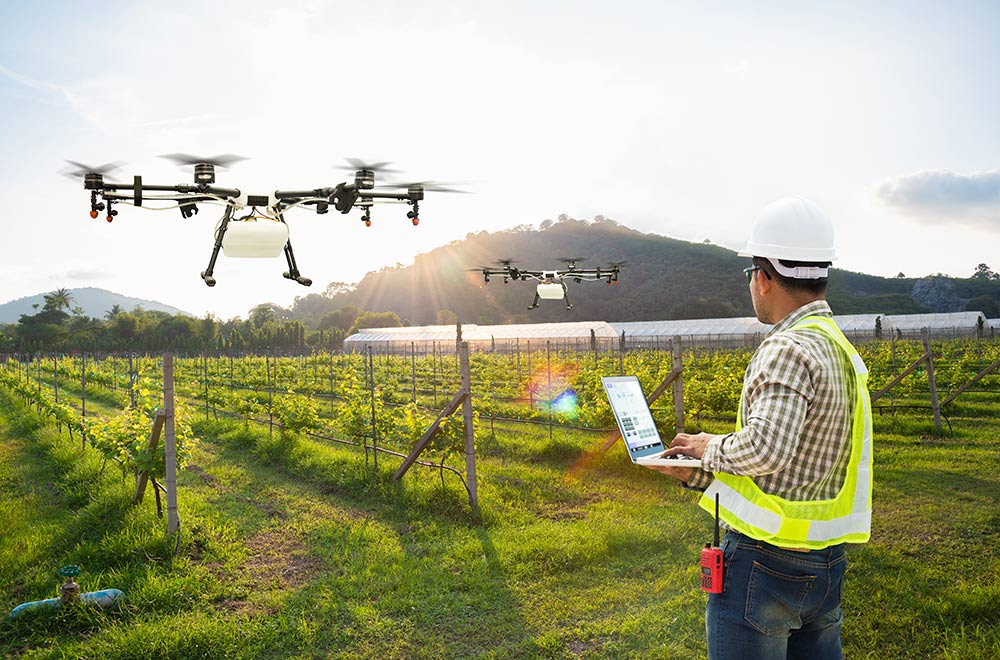Job Opportunities for an Agricultural Engineer
A lot has changed in farming since agricultural engineers worked out how to irrigate the arid land around the Nile and Euphrates rivers before 2,000 BC.
From the Incas in Peru to the Mormons in the Salt Lake Valley, the success of agriculture was all about getting water to the crops. The skill of engineers provided the irrigation infrastructure.
The 18th-century agricultural revolution saw the first major changes to the work of the agricultural engineer. Jethro Tull’s cultivation and seed drilling machines made it much easier to “plow the fields and scatter the good seed on the land.” The industrial revolution fueled a growing population that needed to be fed and clothed, so necessity became the mother of invention.
Edmund Quincy invented the corn picker and Eli Whitney developed the Cotton Gin to selectively harvest the ripe cotton bolls. Joseph Dart invented the first grain elevator and John Deere made a name in agriculture with the invention of the self-polishing cast steel plow. A surprisingly important development as plows started to be pulled by early machines.
In the dairy industry, Anna Baldwin made a significant contribution with the invention of the milking machine.
These agricultural engineers sowed the seeds of farming practice for nearly two centuries and allowed a growing population to put food on the table.
The modern world has had a chance to take stock and assess the sustainability of many farming practices. The dust bowl of the 1920s forced some changes in land management; the world is now trying to reduce the use of artificial fertilizers and work with low-till systems. The work of agricultural engineers is moving towards biosystems engineering and the use of technological innovations like GPS, drones, and robotics to monitor and manage land efficiently.
What Does An Agricultural Engineer Do?
As you may gather, the work of the agricultural engineer is a lot more than digging drainage ditches and knowing how to fix the farm’s combine harvester!
In common with all engineers, as an agricultural engineer, you’ll be using your knowledge of engineering principles to solve problems and create solutions to enable farmers to feed the nation, efficiently and sustainably, for centuries to come.
Agricultural engineering is a wide field so there’s plenty of scope for specializations in areas that you find particularly interesting.
If machinery is your passion then there’s the design of new equipment, improving control of noise, vibration, and safety of power units, harvesters, material handling, and horticultural implements.
Material science is key to managing the physical and chemical properties of agricultural products.
The environmental aspects of farming are an important consideration for the future of agriculture. Water management for irrigation is becoming a critical skill in drought areas and the management of waste from livestock and agricultural residues is vital.
If you’re interested in robotics there’s a major demand for technological innovation for surveying and yield monitoring as well as making the best use of necessary chemicals and fertilizers.
Do You Have What It Takes To Become An Agricultural Engineer?
You’ll need a bachelor’s degree in agricultural and biosystems engineering. Universities in various parts of the country tend to focus on the prevailing local agricultural mix. The degree courses are very “hands-on” with opportunities for internships and work experience visits so if you yearn for the wide-open spaces and grain management then head for Iowa State University. On the other hand, if dairy farming and crop management and its associated technological infrastructure is more your thing, then have a look at Penn State University’s agricultural engineering courses. At Michigan State, Biosystems and Agricultural Engineers focus on solving complex, rapidly changing problems related to food quality and safety, ecosystems protection, homeland security and health protection, biomass utilization, and renewable energy development.
Most universities will offer undergraduate credits for high school students who want to get an early start and can often include practical project work with local agricultural enterprises and machinery manufacturers.
This is engineering so choosing majors in physics and advanced math will be helpful. Of course, there is also a great deal of biology and chemistry involved here too.
What Are The Prospects And Salary Expectations?
Engineering is a high-demand profession and agricultural engineering is becoming increasingly sought-after, particularly in large farming enterprises. They are working to retool and manage change to low till and create sustainable soil management operations.
Major equipment manufacturers like John Deere, New Holland, and AGCO are just a few companies that are eager to hire qualified agricultural engineers.
According to the U.S Bureau of Labor Statistics, the median salary for an environmental engineer is around $84,000 per year.
How To Find The Right Opening
Here at Step Up Recruiting, we specialize in finding the right jobs for engineers so you’re in the right place. Drop us a line and we will help you find your perfect match.



